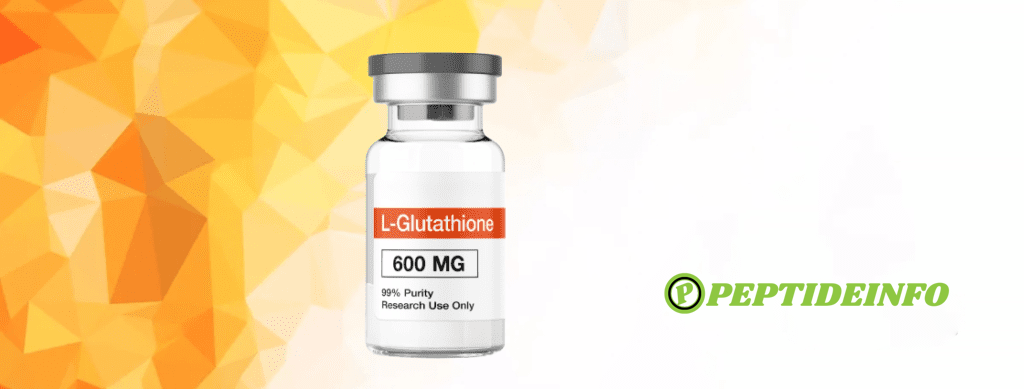L-Glutathione Dosage Chart | Quick Breakdown
| Dosage/Frequency | Dosage | Study duration |
| Daily L-glutathione Dosage for Research | 100mg, 6x/week | 4 weeks |
What is L-Glutathione?
Glutathione (GSH) is an antioxidant that is present in plants, animals, and fungi, and found in nearly every cell of the human brain and body.
It protects brain mitochondria from oxidative stress and recycles other antioxidants, such as vitamins C and E. These key properties of glutathione result in enhanced immune function, protection from age-related disease, reduced inflammation, and the purging of heavy metals—among its many other functions.
Physiological glutathione production may be stimulated through the consumption of sulfur-rich vegetables like onions, garlic, spinach, and cauliflower. Animal food sources such as eggs and chicken, as well as dairy products, are also known to boost glutathione production [1, 2].
But as we age, glutathione production falters. Glutathione deficiency is linked to oxidative stress, which accelerates aging and the pathogenesis of a range of diseases. A lack of this important antioxidant can also negatively impact vision, skin health, and clarity of thought [3].
This is where supplementation with L-glutathione, the active form of glutathione, comes in. Composed of the amino acids L-cysteine, L-glutamic acid, and glycine, the tripeptide is synthesized by the addition of the C-terminal of gamma-glutamylcysteine catalyzed by glutathione synthetase. Glutathione is broken down in the liver by an enzyme called gamma-glutamyl transferase (GGT) [4].
Read on to discover the research-backed benefits of L-glutathione administration.

L-Glutathione Benefits
Research indicates that L-glutathione administration promotes the overall health and well-being of test subjects, particularly as production of glutathione dwindles with age.
Here is a summary of select findings in relation to glutathione research to date.
- Glutathione can prevent and repair oxidative damage by capturing free radicals throughout the body and recharging other antioxidants, thus preventing chronic disease and inflammation. Researchers have observed this protective effect through glutathione’s activation of the Nrf2/HO-1 signaling pathway [4].
- Researchers have found that glutathione can have an anti-aging effect while helping to reduce signs of aging in the skin. For example, Thai researchers conducted a 12-week study on healthy female subjects to see if GSH administration could exert a visual anti-aging effect, in addition to its well-known anti-melanogenic effect. A significant number of the subjects exhibited less wrinkles, better skin elasticity, and reduced photoaging as a result of oral glutathione administration [5].
- Glutathione levels decline in many types of tissue as we age, and this decline can have a significant impact on brain health. In fact, reduced levels of glutathione have been linked to both Parkinson’s disease and neuronal damage following stroke. Because glutathione provides critical support in protecting cells against stress, researchers have found glutathione to be highly protective against stress-induced neuronal damage [6].
- Glutathione is vital to cartilage health since cartilage is particularly susceptible to age-related glutathione oxidation. In a bovine cartilage study, researchers found that inducing oxidant stress (i.e. through exercise) coupled with rest and glutathione administration can optimize glutathione levels in the joints and delay the aging of cartilage [7].
- Glutathione can better prepare the immune system to ward off disease. In a recent study involving the oral administration of liposomal glutathione, human subjects who took 500mg or 1000mg GSH daily had elevated stores of glutathione, and exhibited improvements in markers of immune function and oxidative stress [8].
- Glutathione can boost athletic performance and exercise output. In a study on both mice and humans, researchers found that pre-exercise glutathione administration improved lipid metabolism and acidification in the skeletal muscle of the subjects, resulting in less muscle fatigue [9]. In another study, researchers found that combining glutathione with L-citrulline maximizes the production of nitric oxide, which dilates the blood vessels to improve blood flow and oxygen delivery to muscles and tissue [10].
- Glutathione is also known to promote long-term eye health, namely of the retina, lens, and cornea. The peptide supports the Muller cells, which regulate retinal function and protect the eye against pathogens [11]. It has also been shown to decrease oxidative stress in the eye and delay age-related changes, including loss of visual acuity and the incidence of cataracts [12].
L-Glutathione Side Effects
Glutathione administration has been shown to be well-tolerated, safe, and non-toxic across a variety of research studies and cases.
The research does not link glutathione to any serious adverse effects, but it may cause some mild side effects.
For example, a small number of subjects reported the following mild side effects in the course of a four-week glutathione study at the dose of 1g/day [13]:
- Flatulence
- Loose stools
- Flushing
- Weight gain
In a more specialized study involving cystic fibrosis patients and much higher glutathione doses, some of the patients reported tightness in the torso, diarrhea, and fever-like symptoms [14].
Researchers should also note that low-quality L-glutathione sourced from a disreputable vendor may contain contaminants that can cause acute systemic toxicity. Researchers are thus well-advised to source injectable L-glutathione only from reputable sources, since there is always the risk of adverse effects linked to administering a contaminated product.
L-Glutathione Dosage Calculator and Guide
Preclinical and clinical research indicates that the most effective form of glutathione administration is through injections, with the majority of research suggesting the administration of 600-1200mg of the peptide once or twice weekly via intravenous injections [15].
However, subcutaneous injections are a much safer and more convenient form of administering peptides via injections. This is also why injecting glutathione subcutaneously is the easiest means of administering the peptide in adequate doses, albeit multiple injections are required to achieve therapeutic levels of GSH support.
L-glutathione should be handled and administered only by qualified researchers or laboratory professionals.
L-Glutathione Research Study Length
As mentioned, research recommends administering L-glutathione in doses of 600-1200mg once or twice weekly via intravenous injections [15]. Clinicians presently recommend aiming for the lowest effective dose and administering the peptide at about 600mg/weekly, split into six injections throughout the week.
Current research reveals that the peptide has been used successfully for up to 8 weeks. It may be administered safely for longer periods, as well. Nevertheless, researchers may consider cycling the subject off the peptide for four weeks after every four to eight weeks of therapy.
For reference purposes, researchers may administer the following L-glutathione dosage as part of a systemic detoxification and regeneration protocol:
- Daily Dosage: 100mg, administered subcutaneously.
- Frequency: Six times per week
- Study Duration: According to data, L-glutathione may be administered continuously for four to eight weeks.
- Notes: Do not exceed 1g/weekly. Our preferred vendor sells 500mg L-glutathione vials, as detailed below.

Where to Buy L-Glutathione Online? | 2024 Edition
For a peptide source that is recognized around the world as the benchmark of quality in the industry, this American company sits atop our list.
Research Peptide
Research Peptide
is the retailer of choice for leading researchers due to its unmatched quality and commitment to client satisfaction. The main benefits of our favorite vendor are:
- 100% Verified Product Quality: To support its claims of a high purity level of all items in its vast catalog of research peptides, this vendor provides valid third-party lab test results on all products. The testing method of HPLC-MS is recognized as the standard bearer for accuracy. Plus, the retailer offers transparency on its manufacturing practices, carried out in the USA in compliance with rigorous guidelines with trusted partners.
- Top-tier Products at Great Prices: Domestic manufacturing allowsResearch Peptideto maintain low prices on its premium selection. A 500mg vial of research-grade L-glutathione currently retails for $69.99, and the retailer also offers price reductions depending on the payment method chosen.
- Rapid and Low-Cost Deliveries: Low-cost shipments are offered within the United States and many international destinations. Shipping fees are waived on domestic orders over $350. While domestic shipments usually arrive within just 2-3 days.
- Safe and Easy Checkout: Checkout is a breeze on the SSL-encrypted website, and a convenient range of payment methods are accepted, including crypto, credit cards, and e-check.
- Winning Customer Service: Research Peptideoffers unmatched customer service in its commitment to full client satisfaction. Knowledgeable staff is accessible with quick response times to customer queries. Erroneous orders are happily replaced without charge, and the educational website is packed with scientific articles and peer-reviewed sources.
Buy research peptides from MOB Peptides, a top-rated vendor…
L-Glutathione Dosing | Verdict
Glutathione is known as the “master antioxidant” and regulates a range of key biochemical processes. It is found in many forms of tissue, but unfortunately declines with age.
There are numerous research-backed benefits to administering this peptide, and in this guide we have covered brain health, cartilage health, anti-aging, athletic performance, and more.
With a favorable safety profile, injectable L-glutathione may be dosed in a variety of ways depending on the research objective and factors related to a research test subject.
For more information about L-glutathione or to place an order, visit our top-rated vendor today.


